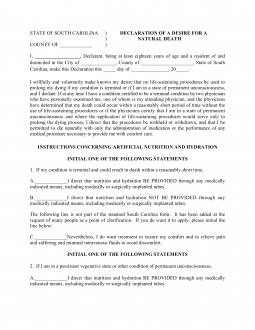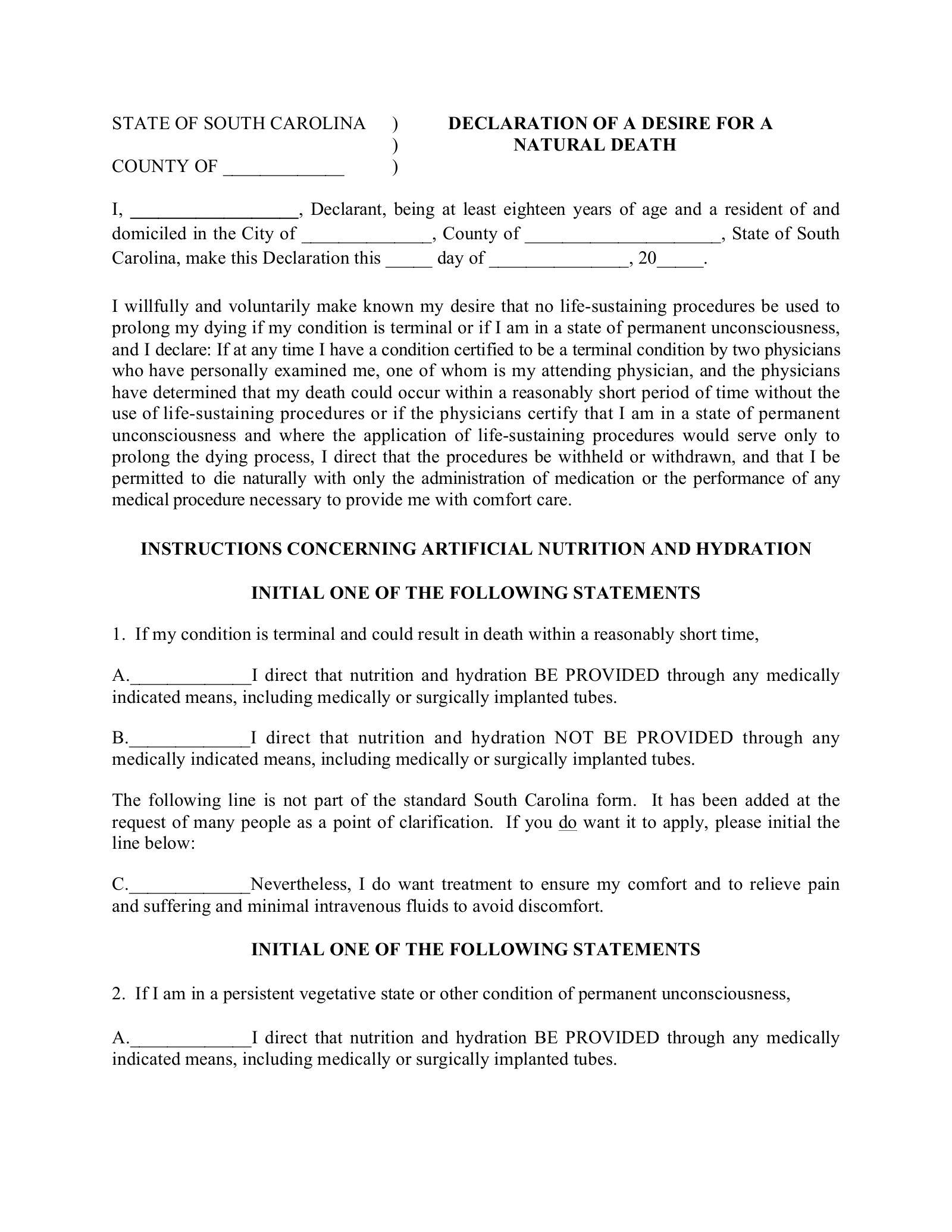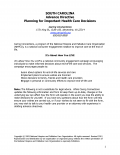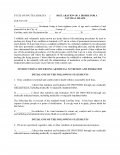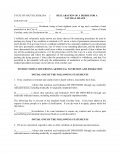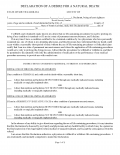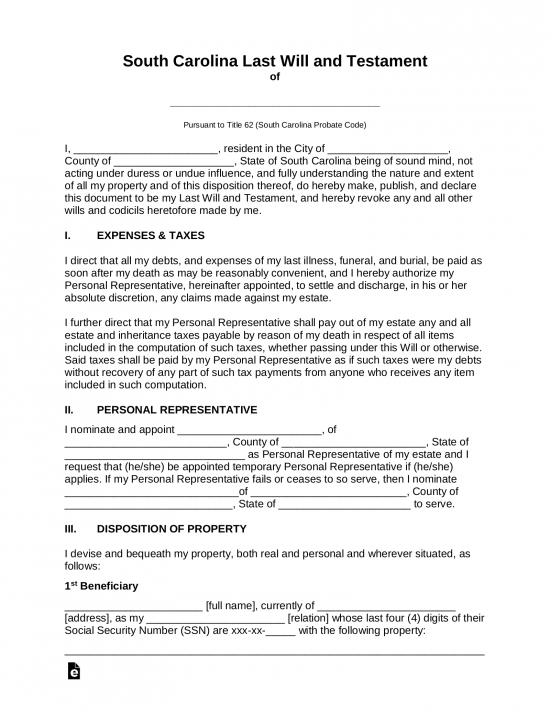Updated July 05, 2023
A South Carolina advance directive is a document that combines a health care power of attorney and a living will. This allows a person to select an agent to handle their medical demands and select treatment preferences. Once the form has been written it’s required to be signed with two (2) witnesses and a notary public.
Advance Directive Includes
Table of Contents |
Laws
Statute – Title 44, Chapter 77 (Death with Dignity Act),[1] Title 62, Article 5 (Protection of Persons Under Disability and Their Property)[2]
Signing Requirements – Two witnesses and a notary public.[3][4]
Versions (5)
Download: PDF
Download: PDF
Download: PDF
Download: PDF
Download: PDF
How to Write
Download: PDF
(1) South Carolina County. The name of the South Carolina County should be displayed at the beginning of this document. This portion may be filled out by a Preparer or, if required, the Notary Public attending the signing.

(2) South Carolina Declarant. The Declarant issuing his or her declaration as the South Carolina Patient should be identified at the start of the declaration made.
(3) City And County.
(4) Date Of South Carolina Declaration. The execution date, or the date when this document is first issued, should be established then recorded.
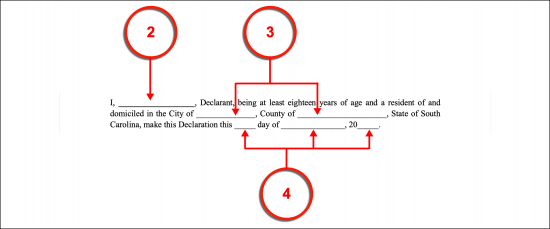
Article 1 When Experiencing The End-Stage Of A Terminal Condition
(5) Request Of Artificial Nutrition And Hydration. When entering the end-stage of a fatal injury, terminal disease, or life-threatening medical event and South Carolina Physicians have declared that death will come in a short time, then the South Carolina Declarant’s directive on receiving medically provided nutrition/liquids will be sought. Option A of the first article declares the South Carolina Declarant’s authorization of receiving his or her food and water whenever needed (even through a machine or tubes). For the South Carolina Declarant to adopt this statement, he or she must present his or her initials.
(6) Authorization To Deny And Withdraw Artificial Nutrition And Hydration. The South Carolina Declarant may prefer to deny invasive methods of delivering nourishment and liquids to stave off malnutrition or dehydration not be delivered in an invasive, uncomfortable, or painful manner (i.e., a tube that is inserted in the mouth or to the stomach). If so, then he or she must initial Option “B.” This informs South Carolina Physicians to remove any feeding tubes and medically delivered nourishment/liquids that may be connected and will restrict Medical Personnel from deciding to deliver nourishment/liquids after the South Carolina Declarant’s diagnosis of being near death.
(7) South Carolina Comfort Care. A final option has been included by demand. If Option “C” is initialed by the South Carolina Declarant then, Medical Professionals will administer I.V. liquids only when absolutely necessary to maintain your comfort.
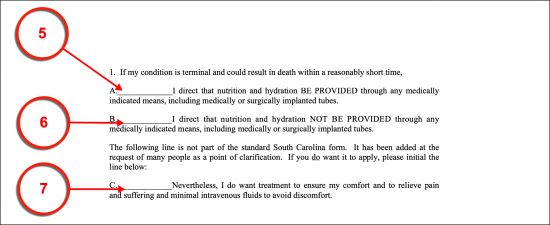
Article 2 If In A Persistent Vegetative State Or Other Condition Of Permanent Unconsciousness
(8) Artificial Nutrition And Hydrations Request. It should be expected that a Patient whom South Carolina Physicians formally declare as permanently unconscious will not be able to eat and drink independently. He or she can initial Option A of this area to inform Physician’s in this state to keep the South Carolina Declarant well-fed and hydrated even if an invasive procedure is required to do so. If this is the South Carolina Declarant’s intention, then Option A must be initialed to demonstrate approval.
(9) Requiring Artificial Nutrition And Hydration Be Denied Or Removed. Naturally, the Declarant may not wish to have his or her life extended any longer than necessary when pronounced to be in a permanent coma, therefore, preferring that artificially delivered nutrition or liquids not be provided in this state. If Option B in this area is initialed, then South Carolina Physicians will not seek to maintain the Declarant’s nutrition and hydration levels as well as disconnect any invasive delivery methods that may be currently in use when this diagnosis is made.
(10) Request Comfort Care Treatment Goals. This form will allow the South Carolina Declarant to request that an I.V. be allowed to administer the minimum amount of fluids to keep his or her body comfortable when diagnosed as being in a coma with no hope of recovery.
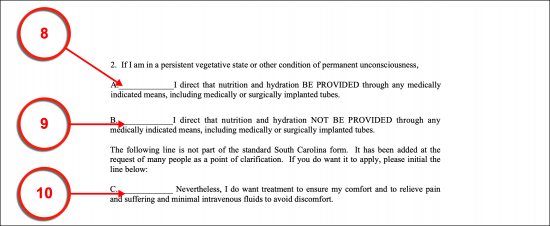
Appointment Of An Agent
(11) Name Of Agent With Power To Revoke. A specific Agent can be appointed with the power to revoke this document and its stated directives on behalf of the South Carolina Declarant. This appointment can be useful should Declarant wish this document to be canceled or become ineffective under certain conditions. It is important that the Revocation Agent and the South Carolina Declarant maintain a clear level of communication to ensure that the Declarant’s intentions will be met appropriately.
(12) Address.
(13) Telephone Number.

(14) Name Of Agent With Power To Enforce. Unfortunately, there may be complications that cause obstacles with the implementation of this directive after the South Carolina Declarant is rendered unconscious. This paperwork thus allows for an Agent of Enforcement to be appointed with the power to see that this directive is implemented according to the South Carolina Declarant’s wishes. The name of this Agent must be documented where requested so that his or her principal-approved authority to enforce this document, even through legal means, can be recognized.
(15) Address.
(16) Telephone Number.

Signature
(17) Declarant Signature. The South Carolina Declarant should sign his or her name while two witnesses and a Notary Public observe.

(18) Witness Affidavit. The Witness Affidavit must be supplied with the County where this signing occurs.

(19) Witness Statement. The Witness Statement must be completed with the name of each Witness and the date of signing.
(20) Witness Testimonial Signature. The signature of each Witness must be produced to the Witness Affidavit under the observance of the Notary Public overseeing this action.
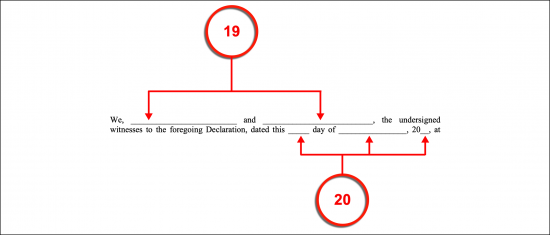
(21) Notarization. Only the Notary Public has the authority to complete the notarization process and provide proof of its completion to the area provided.

Health Care Power Of Attorney
(22) South Carolina Principal Name. The second form of this paperwork serves as an instrument of appointment. The South Carolina Principal behind it will need to be identified before an appointment of principal power can be made.

(23) Title Information. Complete the title with the full name of the South Carolina Principal.

Section 1 Designation Of Health Care Agent
(24) South Carolina County.
(25) South Carolina Principal Name. The full name of the South Carolina Principal should be used to complete the language needed for this directive to grant authority over his or her health care decisions to a specific Agent.
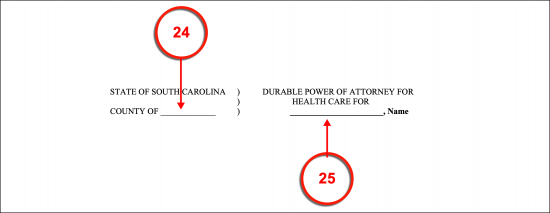
(26) South Carolina Principal Name.
(27) South Carolina Health Care Agent Name. Identify the South Carolina Health Care Agent being appointed with principal authority.
(28) Agent Address And Phone Numbers.
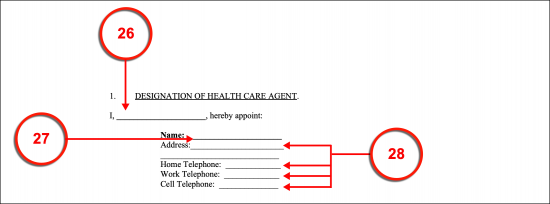
Part A First Alternate Agent
(29) First Alternate Agent Name. The option to designate an Alternate Agent to take over the South Carolina Health Care Agent is available (and recommended). The South Carolina Alternate Agent will not be able to act for the Principal until it is known that the Health Care Agent cannot or will not represent the South Carolina Principal. Should this failure occur, this document will automatically designate the First Alternate South Carolina Agent with the authority to carry out the Principal’s treatment decisions.
(30) First Alternate Agent Address And Phone Numbers.
Part B Second Alternate Agent
(31) Second Alternate Agent Name. This document provides another valuable precaution to the South Carolina Principal seeking to make sure a Representative is available to speak to Medical Personnel in this state on his or her behalf. A Second Alternate South Carolina Agent can be set as a backup should the First Alternate Agent fail to take the place of the South Carolina Health Care Agent. The Second Alternate South Carolina Agent will graduate to the South Carolina Health Care Agent position if both the original agent and his or her Successor do not take this role. Present the full name of the Second Alternate South Carolina Agent where requested to make this designation.
(32) Address And Phone Numbers Of Alternate Agent.
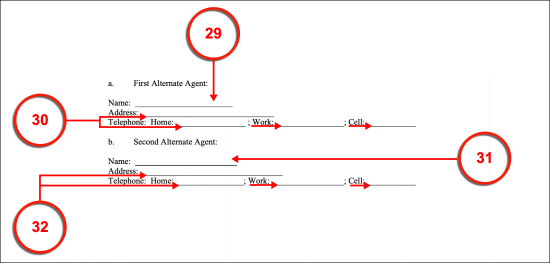
Section 4 Agent’s Power
(33) The Health Care Powers Granted To Your South Carolina Health Care Agent. The list of powers lettered A through D presents the principal abilities that will be granted to the South Carolina Health Care Agent. The South Carolina Health Care Agent will be able, by default, to perform any and all of the actions listed to ensure that the South Carolina Principal receives the care he or she wants. In this way, the South Carolina Health Care Agent will be able to perform tasks such as provide principal consent or refusal of all medical care, surgeries, procedures, treatments, medication, pain management, who will be responsible for the Principal’s care and where this care is received. This list should be reviewed carefully.
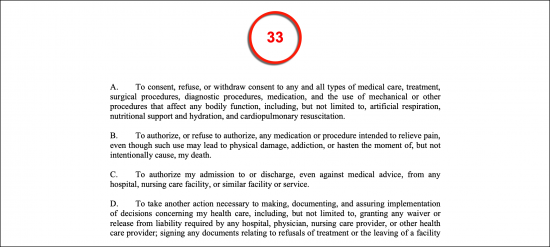
Section 5 Organ Donation
(34) South Carolina Principal’s Organ Donor Status. Notice the item labeled “E.” This addresses specific powers that will require additional participation from the South Carolina Principal completing this form. If the South Carolina Agent has the authority to make an organ donation of the South Carolina Principal’s body, then the Principal must complete the statement with his or her initials to the first line. If not, then the statement must be completed by the Principal’s initials provided to the second line.

Section 7 Statement Of Desires Concerning Life-Sustaining Treatment
(35) Agent Power Of Discretion. The South Carolina Health Care Agent may be given the authority to decide whether treatment is beneficial or overly burdensome then direct Physicians in this state to act accordingly by either providing life-sustaining treatment or withdrawing or discontinuing all life-sustaining treatment. Option “A” (Section 7) must be initialed by the South Carolina Principal to grant this power of decision over life-sustaining treatment to the Health Care Agent.
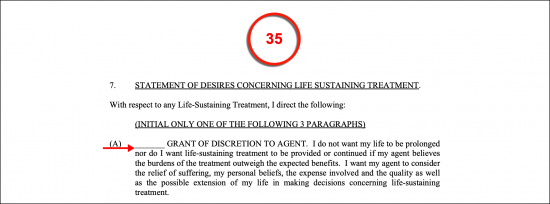
(36) Directive To Withhold Or Withdraw Treatment. The South Carolina Principal may choose to declare that he or she does not wish to have his or her life preserved or extended through modern medicine when he or she is diagnosed as being in a permanent comatose condition or as having an untreatable or incurable medical condition that will cause death within a short amount of time by initialing Option “B” of this section.

(37) Directive For Maximum Treatment. The South Carolina Principal can choose to make it clear that his or her life should be preserved for as long as possible with whatever medical technology is legally available to the Medical Professionals administering care.

Section 8 Statement Of Desires Regarding Tube Feeding
(38) Agent’s Power To Decide. South Carolina Physicians must determine whether they have the approval of the Patient to administer tube feedings (an invasive maneuver where nutrients are provided through a tube inserted into the Patient from a machine). If the South Carolina Principal has determined that he or she will provide consent (or refusal) to receiving nourishment this way through his or her Health Care Agent, then the first option in Section 8 must bear the Principal’s initials.
(39) Tube Feeding Refusal. If the South Carolina Principal has determined that he or she does not wish to receive nourishment through a tube (tube feedings) under any circumstances, then Option B must be presented with his or her initials.
(40) Directive For Provision Of Tube Feeding. Option C of this area will set the South Carolina Principal’s directive to accept tube feedings whenever needed regardless of whether he or she has intended to deny life-sustaining treatment. To set this instruction the South Carolina Principal must dispense his or her initials to the corresponding space.
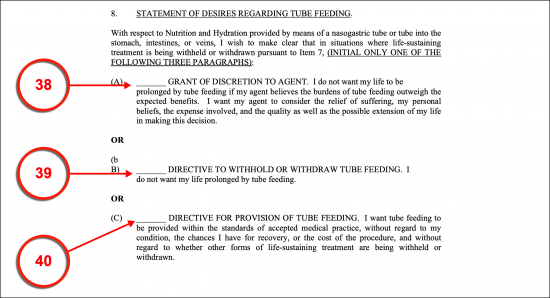
South Carolina Principal Signing
(41) South Carolina Principal’s Signature Date. The South Carolina Principal delegating the power to decide on his or her medical treatment to the Health Care Agent named above under the conditions set forth in this appointment must provide a dated signature.
(42) South Carolina Principal’s Address. The complete residential address must be presented at the time of signing. Once the date and address are supplied, the South Carolina Principal must sign this document.
(43) Signature And Printed Name Of South Carolina Principal. This directive must be signed by the South Carolina Principal. Once he or she is done with this task, the South Carolina Principal must print his or her name then give this document to the first Party who shall verify the act of signing as authentic.
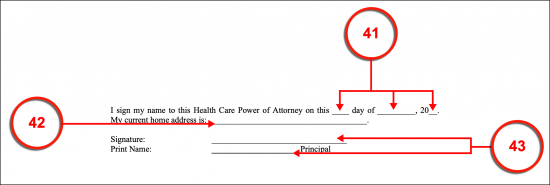
(44) Witness 1 Statement. The first South Carolina Witness to view this signing must review the provided declaration. If it is accurate, he or she must sign this paperwork, report on the current date, then proceed to document his or her name, phone, and address in print.

(45) Witness 2 Statement. The second South Carolina Witness to view the signing must perform this process as well. He or she must prove agreement with the declaration statement by signing and dating this document then delivering his or her printed name, telephone number, and residential address.

South Carolina Physician Orders For Scope Of Treatment
(46) South Carolina Patient Name. The South Carolina Patient, known above as the Principal and Declarant, can combine his or her directives with a Physician’s treatment orders to Medical Personnel in this state. This form can be tended to by the South Carolina Patient or an Authorized Legal Representative (i.e., Health Care Agent) but must be authorized by a licensed Physician, Nurse, or Physician’s Assistant. This form will be kept in the South Carolina Patient’s medical files; therefore, it must open with the South Carolina Patient’s identity.
(47) Date Of Birth.
(48) Declarant Phone Number. Record the phone number of the South Carolina Patient. If he or she is not directly participating in this form’s completion, then the telephone number of the Legal Representative acting on his or her behalf should be produced.
(49) Patient Social Security Number. While the South Carolina Patient’s social security number is not required, it is a valuable identification tool therefore, it is recommended that it be made available.
(50) Patient Gender. Select the appropriate box to define the South Carolina Patient’s gender.
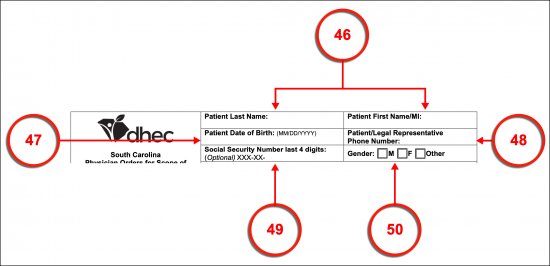
(51) Patient Mailing Address.
(52) Patient Diagnosis. If the South Carolina Patient has a medical condition, disease, or injury (fatal or otherwise) then make sure a record of this is made directly to the content of this document. This area may be used to cite other file numbers of Patient records that would contain more information.
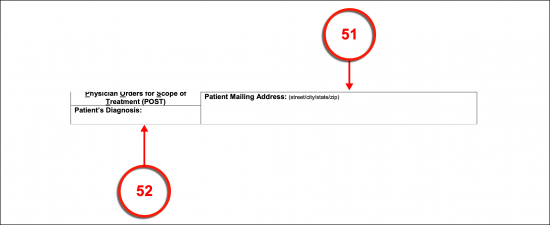
Section A Cardiopulmonary Resuscitation (CPR)
(53) Attempt Resuscitation/CPR. The South Carolina Patient has the opportunity to inform Medical Professionals (in this state) of the acceptable response when he or she is found to have cardiopulmonary (heart/lungs) failure. This medical event will result in death quickly in most cases unless South Carolina Responders and Medical Professionals intervene with cardiopulmonary resuscitation procedures to revive the failed organs. The South Carolina Patient may instruct Physicians and First Responders that they should either “Attempt Resuscitation/CPR” or “Not Attempt Resuscitation/DNR.” To instruct South Carolina Physicians and First Responders to attempt to revive or resuscitate the Patient, select the first statement.
(54) Do Not Attempt To Resuscitate/DNR. Select the second statement to inform South Carolina Physicians and First Responders that this Patient has standing orders to not attempt resuscitation if he or she experiences a failure of the heart or lungs.
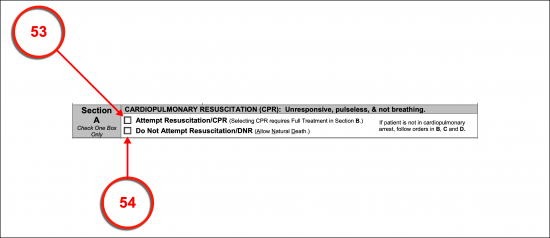
Section B Medical Interventions
(55) Full Treatment. If the South Carolina Patient is subject to a traumatic and life-threatening medical condition when unable to communicate or remain conscious, this document will be referred to by attending Physicians in South Carolina to ascertain the Patient’s desired level of intervention. The order to engage full treatment, including invasive methods such as intubation or hospitalization, can be made by selecting the first directive in Section B.
(56) Limited Treatment. The South Carolina Patient may decide to limit treatment options by denying invasive intervention and care procedures such as intubation/mechanical ventilation and (if possible) to avoid hospitalization and admittance to the ICU (Intensive Care Unit) with the selection of the “Limited Treatment” instruction provided in Section B.
(57) Comfort Measures. To inform South Carolina Medical Personnel that treatment and interventions should only be administered to keep the Patient comfortable, clean, and pain-free while avoiding treatment that does not focus on such goals. Then the final directive option in Section B should be selected.
(58) Additional Orders. Any special considerations or treatment directives that should be applied to medical interventions and treatments for the South Carolina Patient should be documented in the space available.
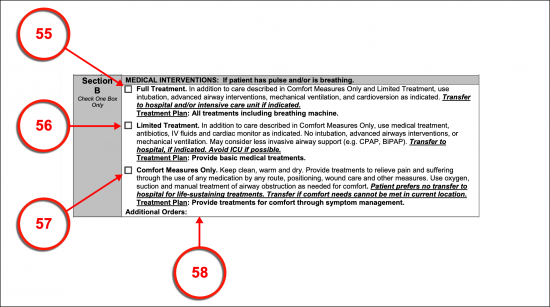
Section C Antibiotics
(59) The Antibiotic Directive. The South Carolina Patient’s preferences on whether antibiotics to treat infections or even prolong his or her life should be indicated in this document. The South Carolina Patient can request that antibiotics are authorized to treat infections and prolong life (if possible) by selecting the first statement in Section C, can request that antibiotics only be used when infection occurs through the second option’s language, or that antibiotics only be used to relieve the South Carolina Patient’s pain/discomfort by checking the final choice. Only one of these checkbox directives may be selected to define how attending South Carolina Medical Providers should handle antibiotics regarding this Patient.
(60) Additional Antibiotic Orders.
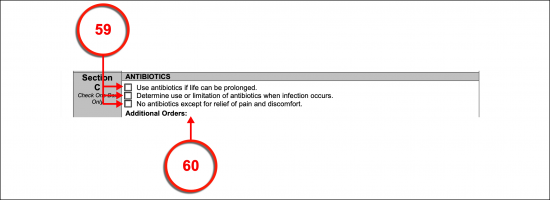
Section D Artificially Administered Nutrition And Fluids
(61) South Carolina Patient Orders On Nutrition. If the South Carolina Patient is unconscious for significant periods of time or has a condition that leaves him or her unable to eat then, the risk of malnutrition will increase while he or she is incapacitated. The authorization to administer artificial nutrition for as long as needed, to deliver artificial nutrition by tube for a trial period, to refrain from providing artificial nutrition, or to decide on the benefits vs burdens of delivering artificial nutrition to the Patient can be documented by selecting the appropriate directive from the first column of Section D.
(62) Additional Orders On Artificial Nutrition.
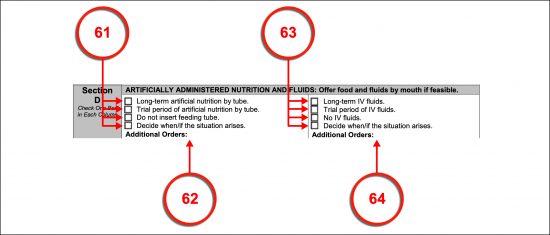
(63) South Carolina Patient Orders On Fluids. In addition to running the risk of malnutrition when the South Carolina Patient is incapacitated and suffering a traumatic medical condition, the South Carolina Patient will also be in danger of dehydration if he or she cannot intake fluids for any period of time. Direct instructions regarding the administration or delivery of fluids through medical technology (artificial hydration) can be solidified by marking the appropriate checkbox from the second column of Section D.
(64) Additional Artificial Fluids Instructions.

Section E Signature Of Physician, Advanced Practice Registered Nurse, Or Physician Assistant
(65) Physician/APRN/PA Signature. The consulting South Carolina Medical Professional must complete the signature area to authorize these medical orders. He or she must begin this process by signing his or her name.
(66) Physician/APRN/PA Printed Name.
(67) Medical Professional Status. The professional status of the authorizing South Carolina Medical Professional must be indicated by marking the checkbox labeled “Physician,” “APRN” (Advance Practitioner Registered Nurse), or “PA” (Physician’s Assistant).
(68) Signature Date.
(69) Phone Number.
(70) License Number. The assigned license number that allows the South Carolina Physician, Nurse, or Physician’s Assistant to practice medicine in this state should be dispensed.
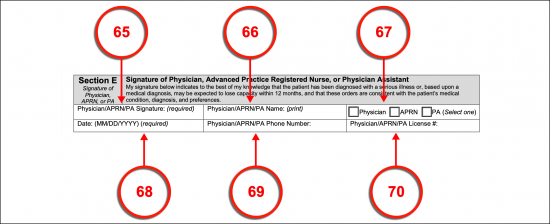
(71) Discussion Participants. Indicate each Party (excluding Medical Personnel) who has contributed to the Patient’s medical orders that are presented in this document by marking the checkbox description that best applies. You may select as many boxes as appropriate.

Section F Signature Of Patient Or Legal Representative
(72) Signature. The South Carolina Patient or his or her Legal Representative must sign this document as verification that it accurately reflects the level of treatment expected.
(73) Relationship. If a Legal Representative of the South Carolina Patient has signed this paperwork then he or she must define the “Relationship” held with the Patient (i.e., Health Care Agent, Sibling, etc.) If the South Carolina Patient has worked directly on this document and signed it then he or she must report the “Relationship” status as “Self.
(74) Printed Name And Signature Date.
(75) South Carolina Signature Party Phone Number.
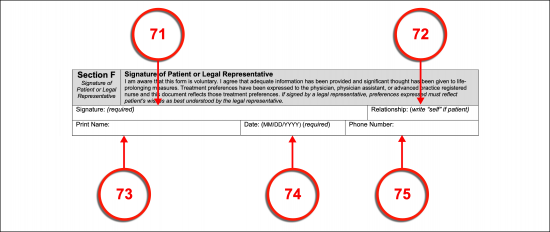
Section G Facilitator Assisting With Post Form Completion
(76) Facilitator Information. The full name and contact information of this document’s Preparer should be recorded. In many cases, this will be an Employee of the Medical Facility aiding the Patient with this form.

Post Form Completion Information
(77) South Carolina Patient Name. Since this form must be kept in the South Carolina Patient’s files, every page must bear his or her identity, even if it is left unattended. Produce the complete name of the South Carolina Patient as requested.

(78) POST Advance Directive Status. It is recommended that the South Carolina Medical Professional completing and authorizing this form take a moment to review the Patient’s other directives. Once done, he or she should indicate the status of these directives as being reviewed on a certain date or as containing a conflict with the Patient’s POST. If this is not possible because the South Carolina Patient’s advance directive is not available or has not been executed, then the South Carolina Physician should make a note of this using the appropriate checkbox statements.

Related Forms
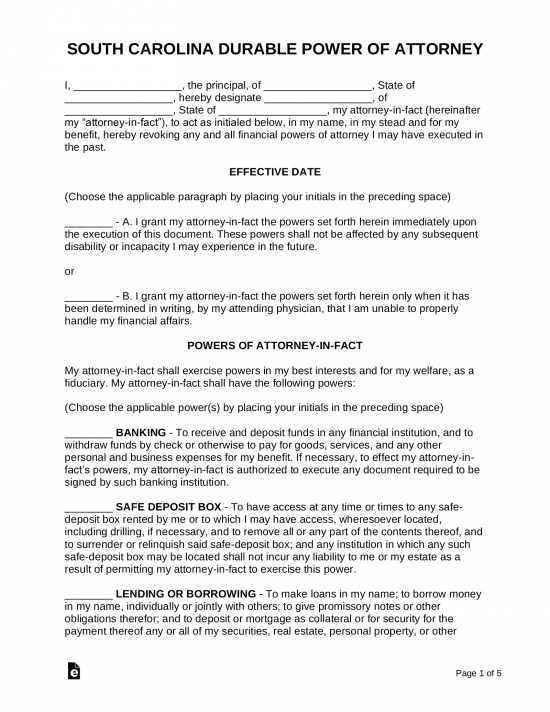 Durable (Financial) Power of Attorney
Durable (Financial) Power of Attorney
Download: PDF, MS Word, OpenDocument
Download: PDF, MS Word, OpenDocument

